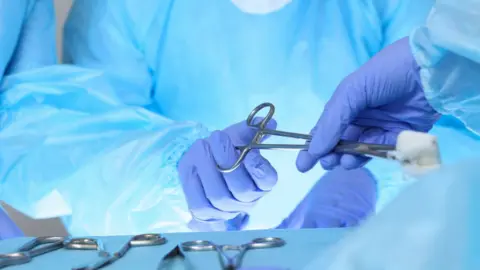No-deal Brexit: Should NHS patients be worried?
 Getty Images
Getty ImagesHospitals warning vital supplies might run out and operations would be cancelled, an ambulance service stockpiling tyres, and officials "close to panic" - these are recent stories about NHS efforts to plan for the possible consequences of the UK leaving the European Union with no agreement in place at the end of March.
So, should patients be worried? There are two answers.
Ministers and NHS leaders say every effort is being made to ensure there will be enough medicines and clinical equipment available in the event of delays to imports caused by traffic chaos near the Channel ports.
The Whitehall line is that everything that can be done is being done.
But the other point being made is this is an unprecedented scenario - and nobody can be sure what will happen if the UK leaves the EU without an agreement.
There is a tension at the heart of NHS no-deal planning.
On the one hand, there is a need to reassure the public and avoid panic stockpiling of medicines, which would simply exacerbate supply shortages.
But on the other, senior hospital executives need to identify the risks to their organisations and patient care and warn of any gaps in planning.
A board paper at a leading hospital trust, revealed by BBC News, sets out in stark terms what might happen in a chaotic no-deal scenario.
In it, Dr David Rosser, chief executive of University Hospitals Birmingham Trust, says: "By far the greatest concern is the availability of medicines, devices and clinical supplies."
He questions the reassurances from the government and says trusts still don't know which products are at risk.
Trusts, he says, could "quickly run out of vital medical supplies".
 Medioimages/Photodisc
Medioimages/PhotodiscDr Rosser makes the point that complex surgery on a patient does not begin until thorough checks are made on the right supplies and equipment being available.
But the checks applied in the operating theatres do not, he says, cover post-operative care, during which medicines might not be obtainable.
And there would, therefore, have to be widespread cancellations of non-urgent operations.
The Birmingham memo has emerged days after news of a discussion about a no-deal Brexit at a board meeting of University College London Hospitals Trust was revealed in the Evening Standard.
Close to panic
At this meeting, the chief executive, Prof Marcel Levi, told colleagues the tone from government and NHS officials had changed completely in recent weeks.
And words of reassurance had been replaced by "almost daily communications which are very close to panic".
Meanwhile, it has also emerged that separate papers, for the London Ambulance Service board, include a reference to preparing for "potential disruption following the UK's exit from the EU".
And this includes stockpiling fuel and tyres and "discussions with the military… to establish support if required in the event of political unrest".
Ministers and NHS leaders, meanwhile, say they already have robust contingency plans for a difficult no-deal Brexit scenario:
- A six-week stockpile of essential medicines has been built up by pharmaceutical companies in the UK
- A plane has been chartered to fly in drugs that can't be stockpiled.
- Warehouses with refrigeration capacity have been rented
- Ports other than Dover and Folkestone are being prepared to take ferries with lorries carrying imported medical supplies
And NHS officials say they have completed an exhaustive analysis of drugs that might be affected by supply disruption.
A Department of Health and Social Care official said: "We are working closely with the NHS, industry and the supply chain to make detailed plans to ensure continued access to healthcare, medical devices and clinical supplies in the event of no deal."
But clearly hospital managers are not totally convinced that national level contingency planning as currently described is sufficient.
The deputy chief executive of NHS Providers, Saffron Cordery, said: "Trusts are following advice from government closely - but at this stage, they urgently need more clarity.
"A disorderly Brexit could pose a risk to the supply of medicines and equipment.
"There would also be implications for staffing across vital health and care roles."
Ministers have a tricky balance to find.
Patients need reassuring that stockpiles are in place to ensure their medication will be obtainable.
But hospital managers have to be helped to cover every eventuality that might threaten patient safety.
As long as no deal is agreed and 29 March draws closer, this balancing act will become harder to achieve.
